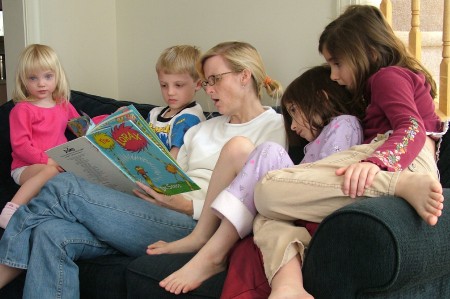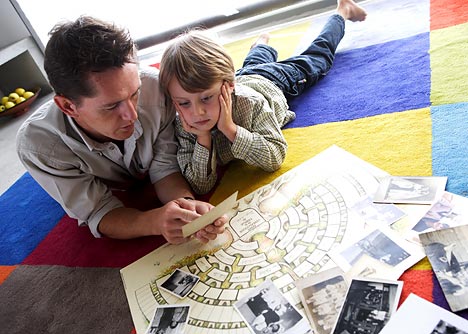
“I’ve started this Structured Family Time and wow is it hard to settle down to doing that. It works for us to do it on M,W,F starting at 9 in the morning, so we read scriptures, read from a classic, and have family prayer for the opening part. Then I let them choose the activities they want to do until the afternoon. The Spark Station is available during that time and they do use it.
I just listened to the recording on being present and it says that the mom shouldn’t be doing other things during structured family time, except being there for the children. (Or at least that’s how I’m hearing it.) I give them an hour of focused time during our opening, but then I’ve been doing my projects while they do theirs, stopping if they need my help. My children range in age from 8 years to 17, so are able to do most of what they do on their own. I find that I do better during that time if I’m not on the computer or listening to my mp3 player, because then when they need me, it feels like they are interrupting me and I get annoyed when it keeps happening.
My question is: Should I not be doing my projects during that time? And if not, what should I be doing while they’re all busy doing their stuff?
I’m so excited to be taking this course. Thanks for all your great information!”
Melody
Let’s look at the questions in Melody’s email. First, structured time and being present are difficult because they challenge how we live most of life, running from one thing to another while thinking about the other 10 things we need to do.

Structured time is about stopping long enough to listen, hear and respond to our children. That is why it is so valuable because it can’t help but affirm the belief that “I matter, I am important” because it is so different than how we really live life.
The truth is that it will take time to feel comfortable with structured time. It will take time to quiet your brain and it frankly, takes time not to have the feeling that you need to get on to what is really important. That is always hard to admit because we want to believe that we think our family and children are most important but often our actions don’t tell that same story.
In thinking about it a lot, I have decided that it is a matter of what seems to be most imperative right now. Preparing for the church play, the PTA meeting, laundry, they are all imperative, they have deadlines. Children don’t have discernible deadlines. They are with us every day. There is always tomorrow to get to them. But I can tell you from experience that time will pass fast and that there is definitely a deadline with the wonderful things that we want to do with our families.
Melody asks, “Should I not be doing my projects during that time? And if not, what should I be doing while they’re all busy doing their stuff?”
 Well, in my opinion it depends on your projects. The computer, in my mind, is a no no, because it sucks us in so completely. It is hard to tear away. When we are called upon for help the usual answer is “just a minute” while we finish an email, etc. The computer and an MP3 player are sort of isolating activities. Watch people on the street with their IPod, MP3’s and so forth and they just seem to shut others out.
Well, in my opinion it depends on your projects. The computer, in my mind, is a no no, because it sucks us in so completely. It is hard to tear away. When we are called upon for help the usual answer is “just a minute” while we finish an email, etc. The computer and an MP3 player are sort of isolating activities. Watch people on the street with their IPod, MP3’s and so forth and they just seem to shut others out.
Of course it goes without saying that if your projects are dishes, laundry, talking on the phone, vacuuming, or doing anything in another room or that requires you to make trips in and out of the structured time area, then it is on the no no list. You can’t give your children the sense that this time really matters and that they really matter if you are doing what you do all day, every day.
Structured time is the perfect time to model what you want so I say read, write and then discuss with your children.
Melody also mentions, “I find that I do better during that time if I’m not on the computer or listening to my mp3 player, because then  when they need me, it feels like they are interrupting me and I get annoyed when it keeps happening.”
when they need me, it feels like they are interrupting me and I get annoyed when it keeps happening.”
I’d like to talk about the issue of feeling interrupted. Even if you are reading and writing that feeling can and probably will occur. I find that it helps to go into it knowing that whatever I am doing is an example I am setting and that my real intent is not to make discernible progress but to model a behavior that I want children to see.
I also find it helpful to just observe. If the 17 year old is reading a book on President Woodrow Wilson , ask a question, “Do you like the book,what do you think about the President”. See where that conversation goes. If you have read the book make a comment about what you thought and felt.
If your 8 year old is building with Leggo”s make a comment, “I noticed that you spent some time thinking about what you were going to build before you started”. Then listen. I love “familiar conversations” because they keep me involved, give me a feeling that I am doing some good work, and give me an opportunity to listen. If no one really engages in a conversation then read.
Be aware that whatever you do there will be a tendency to feel interrupted. I guess that is why I spend a lot of time just observing and participating where I can. And in the final analysis remember that your real job during this time is to respond. You can’t do that if you aren’t mentally there or if you have any other agenda than being with and enjoying your children.
Possibly Related Posts:
- Self Care for Better Parenting – Part 2
- Self Care for Better Parenting – Part 1
- Got Kids 24/7 – 2 Tips to make life easier
- The Screen Free Experiment
- 5 Tips to Put Family first



{ 0 comments… add one now }